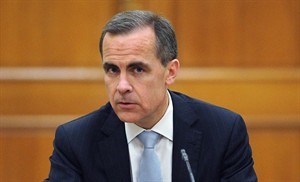
Bank of Canada Governor Mark Carney appears at a Commons finance committee on Parliament Hill in Ottawa on Tuesday, April 24, 2012. Carney is warning the Canadian recovery may be running out of fuel. THE CANADIAN PRESS/Sean Kilpatrick
June 21, 2012 - 11:57 AM
OTTAWA - Canada's relatively healthy economy has been largely based on borrowed money but the situation cannot go on indefinitely, Bank of Canada governor Mark Carney warned Thursday.
The central bank governor's stern words to a business audience in Halifax comes just hours after Finance Minister Jim Flaherty moved to clamp down on household lending by reducing the amortization period on mortgages to 25 years from 30, and by limiting home equity loans.
Carney makes clear that he endorses the moves, calling them "prudent" and "timely" to support the long-term stability of the housing market and guard against financial excesses.
And although he repeats language used in the past, Carney also suggests he has no patience for the view that instead of raising interest rates his next move will be to cut the trendsetting policy setting from the current one per cent, where it's been since September 2010.
"Our economy cannot … depend indefinitely on debt-fuelled household expenditures, particularly in an environment of modest income growth," he said in notes of the speech released in Ottawa.
"Notably, housing investment rose further in the first quarter, accounting for an unusually elevated share of the overall Canadian economy."
Earlier this month, Statistics Canada reported that household debt in relation to disposable income had reached a new record at 152 per cent, but much of that was due to falling incomes rather than increased borrowing.
Still, there's evidence of consumer fatigue already. In a report issued Thursday, Statistics Canada said retail sales fell an above-consensus 0.5 per cent in April.
Carney said that if the current economic expansion in Canada continues, "some modest withdrawal" of monetary stimulus — interest rate hikes — may become appropriate.
The governor has used similar language on interest rates before, most notably the last two policy setting dates, but markets are largely ignoring his warning given the darkening storm clouds gathering outside Canada's borders.
On Thursday, the CIBC suggested that Carney may have little choice but to keep interest rates where they are until 2014, assuming that's the time the U.S. economy shows some signs of life.
Carney gives every indication in his speech that he is worried about the global recovery, particularly the growing risk that Europe's debt crisis will expand and set off a chain of events that lead to slower global growth, and possibly even a double-dip recession.
Some of the risks around the European crisis are materializing, he said, and now the outlook is "skewed to the downside," which means it is more likely the situation will get worse than improve.
This is already impacting the global economy. Slow growth in advanced nations have slowed expansion in China and other emerging markets, which have supported what little global growth there is. For Canada, this has meant the price of commodities like oil that Canada sells to the world have fallen, although they remain elevated.
But the real danger is of European contagion, which given the inter-dependent global financial markets, will hit Canada as well.
Even Canada's strong fundamentals won't save us, Carney said.
"Given the reality of global finance, it is not enough to have our house in order unless we seal ourselves off from the world," he said. "And if we do that, we will end up much poorer."
Carney's words echo those of Flaherty early in the day, when he warned that unless Europe acts quickly to contain the damage, Canadians will be in for a difficult summer.
The government made clear the solutions will not be easy, nor will they be instant. He said policy-makers must work to get the structure of the global economy right, fix the European monetary union, move to resolve global imbalances between borrowing nations like the U.S. and creditor nations like China, and continue with financial reforms that will end "too-big-to-fail" banks and build resilient institutions.
News from © The Canadian Press, 2012